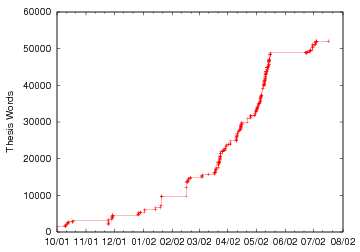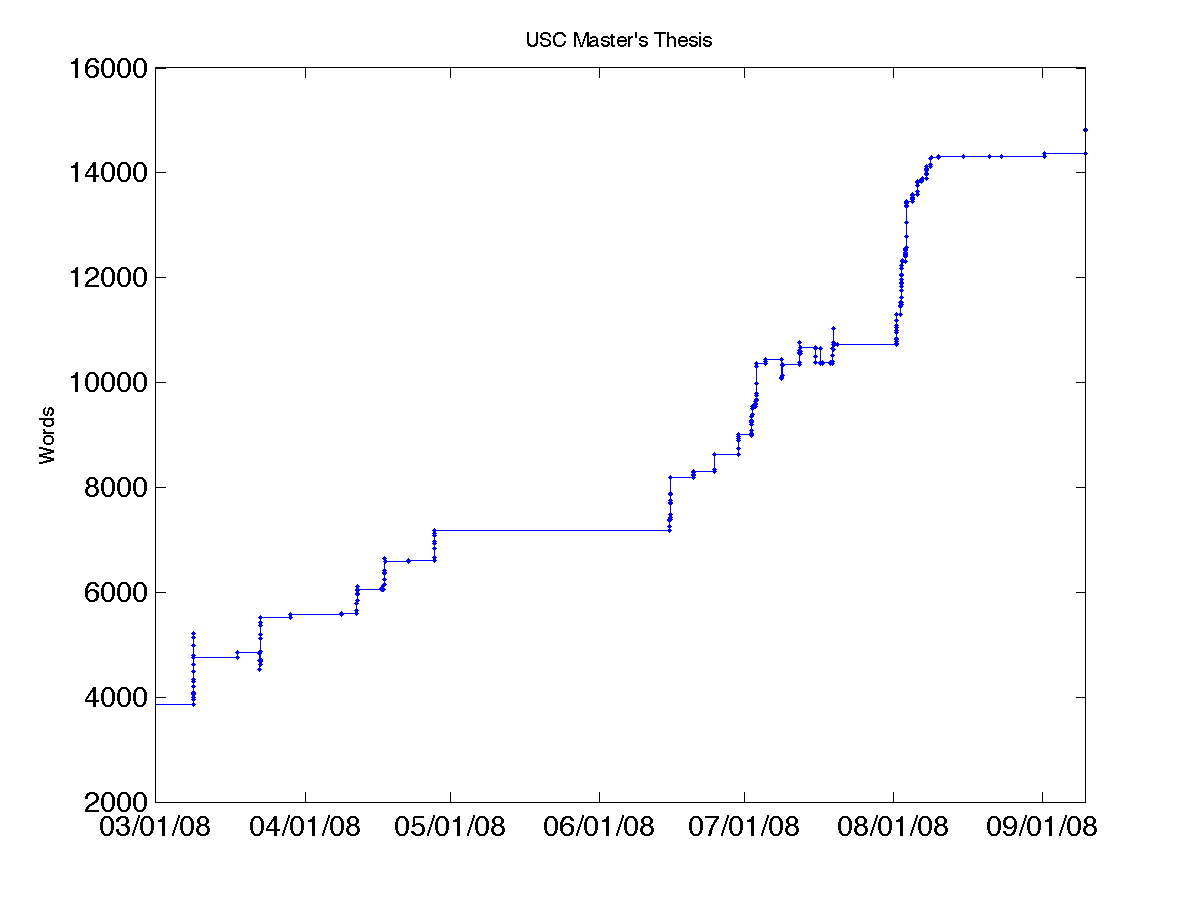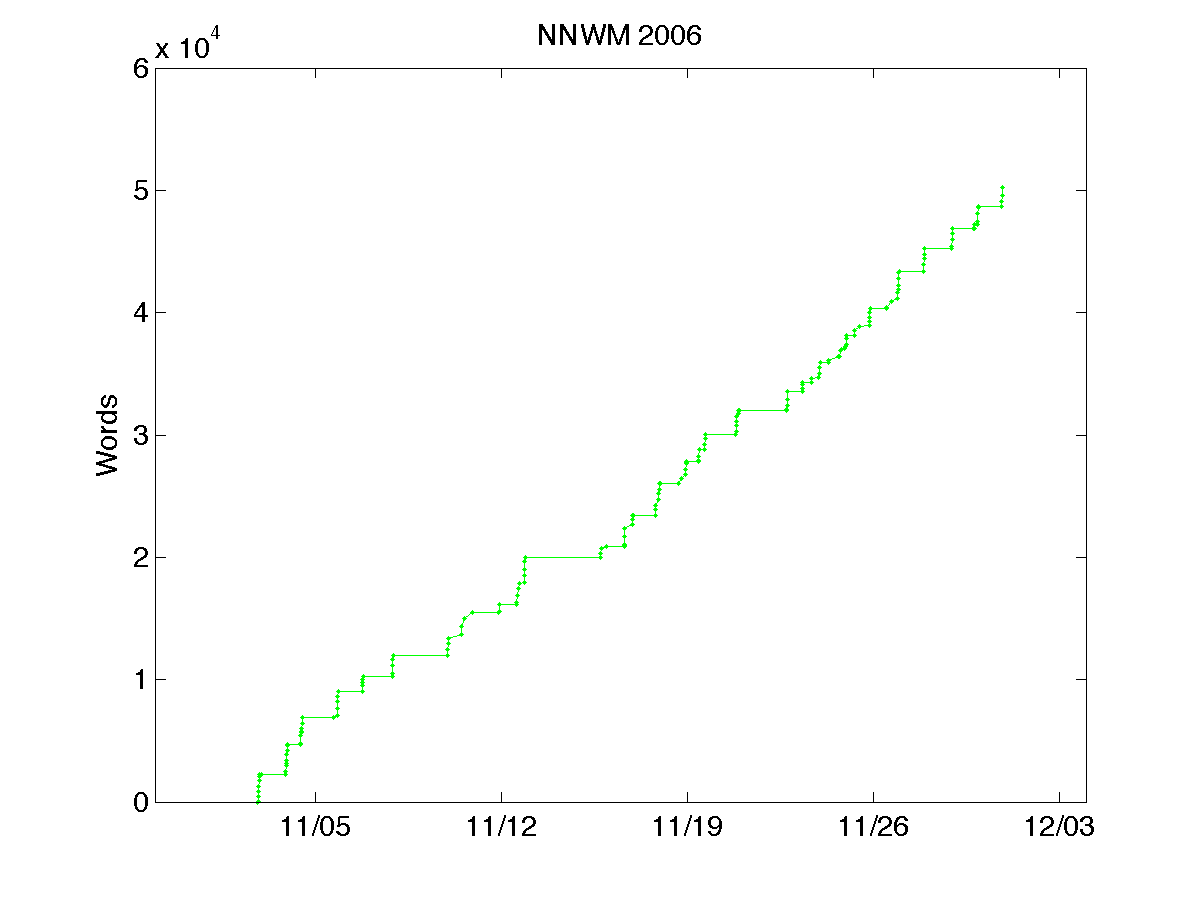Productivity in Writing
September 21st, 2008 at 10:21 pm (Productivity, Writing)
I’ve tackled a few large writing projects over the past few years. Because I am a geek, I wrote a script that tallied the number of words I’d written every 15 minutes during each project. Because I am a scientist, I’ve analyzed the results and determined that, in each case, very different behavior is evident.
Among other things, writing my dissertation in 2001-2002 was an exercise in pure, undiluted focus. For several months, I did little but wake up, eat, write, sleep, repeat and repeat and repeat.

There are some gaps in November and December due to working on job applications and otherwise being distracted. The gap in February occurred when I fell victim to some horrible contagion that had me flat on my back for days, stole my voice, and forced me to reschedule a job interview. But from March to mid-May, it was smooth sailing. As my deadline approached, you can see the slope increasing until, near the end of May, I submitted the dissertation to my committee members for their review. I defended in June, made some revisions, and finally Phinished in July.
However, that smooth exponential behavior was not observed while working on my Master’s thesis in 2008:

Progress occurred in a very discontinuous way, because this time I was fitting writing time around my work schedule, mostly on weekends. I learned first-hand how hard it is to write a large document when each time you return to it, you have to invest significant effort in re-acquiring your train of thought. (The large gap in late May cannot, however, be blamed on work, and was instead due to a fabulous trip to Japan.) Writing also had to compete with coursework for my attention until early May. But it wasn’t only the time constraints that slowed me down. My job already involves a lot of technical writing, and I often found that at the end of the day the writing part of me felt drained dry, with little left over for more technical composition. Sure, the dissertation was much longer than the thesis… but sometimes it felt like writing the thesis took even more determination and willpower to bring it into being.
It’s interesting to contrast both of these to my productivity during November 2006, in which I tackled a work of fiction. National Novel Writing Month challenges you to write 50,000 words in 30 days. Now, my dissertation was just over 50,000 words, so I knew it was theoretically possible–except that I’d had much more than a month to write it. Of course, writing fiction is a whole different ballgame, unfettered by factual reporting and experimental results. Since the goal is to produce a certain number of words, rather than a coherent document about a research project, it’s much easier to break it down into equally sized daily word count targets, which we see reflected in the plot:

This one is much better fit by a linear trend than an exponential one, indicating almost no procrastination that would otherwise necessitate a final push. But “procrastination” is a deceptive term. Exponential productivity in writing a thesis or dissertation is not necessarily a result of procrastination; you can’t really split up the final goal into tiny daily chunks because it’s hard (or impossible) to define what the final product should look like until you’re already there. Outlines are helpful, but no one can predict how many words it will take to address each point you need to make. Overall, I learned that if the goal is raw, regular productivity, then I can meet it, at least for a month (even working around a full-time job and the hardest class I ever took at USC!). On the other hand, if I’m attempting thoughtful, substantial, technical composition, then I do best with solid uninterrupted chunks of time. This definitely isn’t a place where I can work wonders while multitasking!
Eric said,
September 21, 2008 at 11:00 pm
From where did the snapshot of each 15 minutes of progress come?
Kevin said,
September 22, 2008 at 12:02 am
You are a geek. As the checkbox says, I guess I knew this already, but it’s still fabulous.
wkiri said,
September 22, 2008 at 10:20 am
Eric, these documents were all written in text files or latex files. I have a shell script that greps out commented lines and then does a word count on the files I’m tracking. My crontab runs the script every 15 minutes for me and writes out the current word count to a separate file. To save space, it only writes out a word count if it’s different from the last entry. The hardest part of the script, actually, was coming up with a useful date format to attach to each word count observation and creating a fake observation one minute before “now” to copy the old filesize (otherwise I’d get diagonal lines that made it look like I’d been slowly typing half a word a day in the intervening time) :) I’m sure this was more than you wanted to know.
Kevin, thank you for the compliment!
jim said,
September 24, 2008 at 10:35 am
(Knew you were hard-core.)
I’m curious if you did any word frequency analysis on the final documents, and if so, were there any surprises.
Henry Segerman said,
October 5, 2008 at 3:58 pm
This is wonderful.